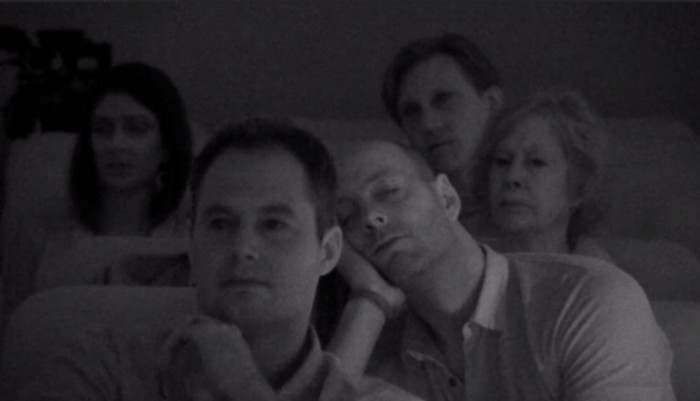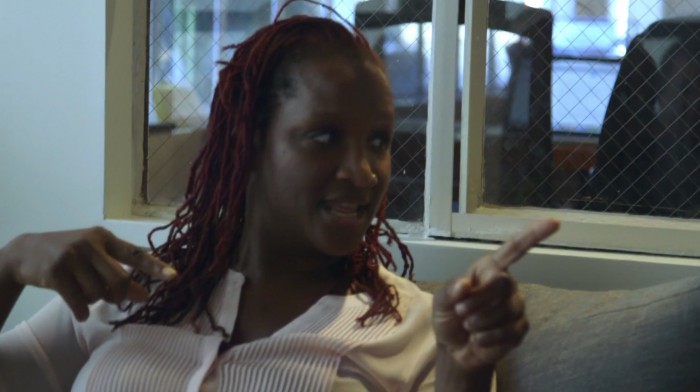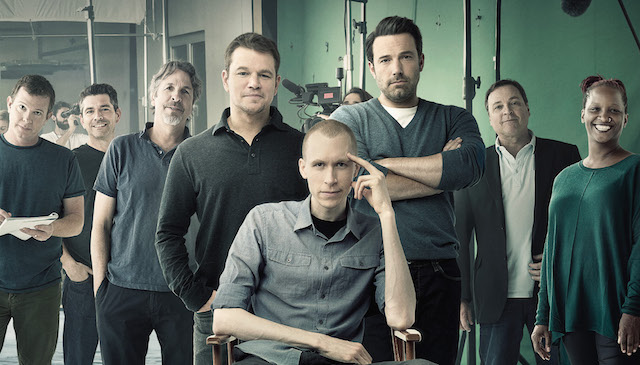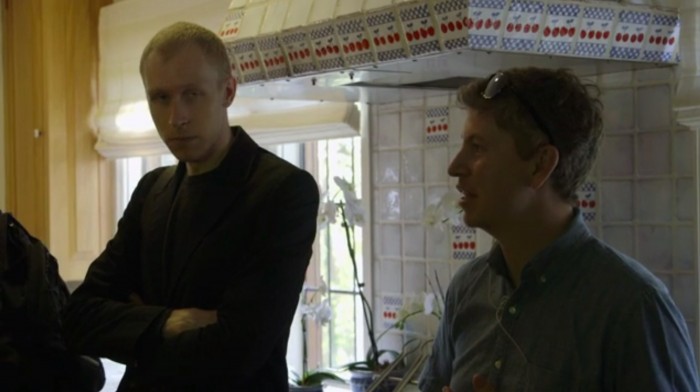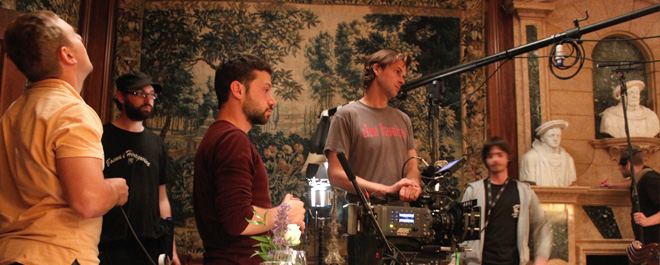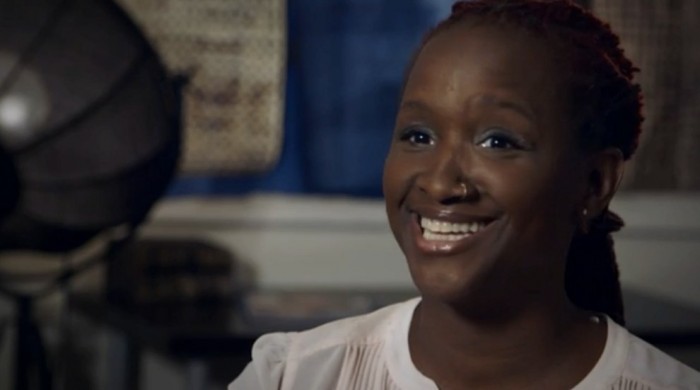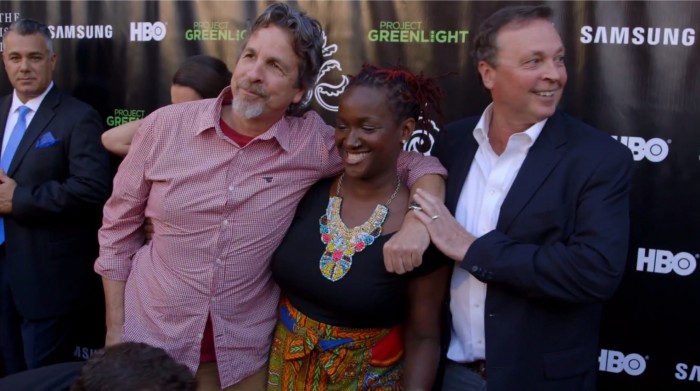Project Greenlight Season 4: What You Didn't Know
I'm a huge Project Greenlight fanatic. I've been watching the HBO series since it first made its debut in 2001. Actually, I even had a submission in for the second season of Project Greenlight (which was just a scene from the feature film I co-directed). This season of the HBO filmmaking "documentary" series was filled with drama, which I chatted about at length during this week's /Filmcast.
Project Greenlight, like any reality series, shows a version of events that may or may not happened exactly as presented onscreen. 20,000 hours of footage is edited down into the four and a half hours of television that aired on HBO, and characters and storylines are streamlined and packaged to maximize the drama. So what is the reality behind the show? We'll never know as we were there in person. But we can listen to a few of the people who were there, namely director Jason Mann and producer Effie Brown, who have commented publicly about the process.
In addition, there are a variety of things I have noticed or learned since watching this season of the show that you probably didn't know about. So if you watched the fourth season of Project Greenlight, hit the jump to learn some information about what you might have missed.
Jason Mann Didn't Direct The Leisure Class (2012)
After winning the competition, the second episode featured a huge twist: filmmaker Jason Mann pitched the idea of directing his own feature-length script based on a short film of his called The Leisure Class, instead of the original Not Another Pretty Woman script as planned for the competition reality series. In the episode, the producers are presented with the original short film as Mann and screenwriter Pete Jones' pitch to change the project. We see the producers laughing at the short film, followed by a shot of the credits showing that Jason Mann was one of six writers and the producer of the film.
But what we aren't told is that Jason Mann did not direct the Leisure Class short. The 14-minute film which premiered at the Raindance Film Festival in London in 2013 was actually directed by a man named Richard Dewey. Not a huge deal as Jason "conceived" of the story and was one of the writers on the project, but the editing on the show seems a bit deceptive.
The short was apparently the result of an exercise Mann participated in for his first year at Columbia University for the MFA program. In an interview with Entertainment Weekly, Mann explains why he didn't direct it himself:
In the first year at Columbia, they do this exercise where you swap scripts with another student. I made two films back-to-back, and I ended up collaborating on the one that I wrote, which ended up being The Leisure Class. I had cast those actors and worked with the actors. I found [actor] Tom [Bell], who I love.
When asked if he spoke with his Columbia classmates before turning the short film into a feature, Mann responded "No, it was entirely mine. The people that I had collaborated with, I had spoken to them about it, and we made sure everyone was cool with it. It was my script to do what I will with it. There was, especially with the actors in the original short, so much creation in the moment."
The Man Who Fell Asleep During the Test Screening
During the season finale of Project Greenlight, we got a look at a test screening that was held for The Leisure Class at William Morris. While the screening began well, by the middle of the movie it seemed like no one was laughing at this dark comedy. Shots of bored audience members were shown, and then this shot of a man seemingly falling asleep during the movie.
Who is this man? George Heller, filmmaker Jason Mann's manager at Apostle Management. I reached out to Heller for comment (maybe this was the sixth time he was screening the film?) but after his first response to me he never followed up. I'd be interested to hear what Jason Mann thought when he watched the episode and saw his own manager falling asleep during the screening of his movie.
Effie Brown Loves to Say "Duly Noted"
When she's not telling you how many films she's produced, you may have noticed that Effie Brown seems to love to say "duly noted." The fourth episode of the show was even titled "Duly Noted" because of this. Well, you might be interested to learn that Effie Brown's production and consulting company is called Duly Noted Inc.
Project Greenlight Is a Reality Television Show, Not a Documentary
Every episode of Project Greenlight opens with an explanation that Project Greenlight is a documentary allowing us to see the filmmaking process. This might be obvious, but Project Greenlight is not a documentary. It's more akin to a reality television series. And in that respect, you have to understand that the final result is edited together in a way to be more dramatic. You would be surprised at what was not included to elevate the dramatic moments.
Mann has said that he tries to avoid watching the show as much as he can, but was forced to watch the series to record the behind-the-scenes "inside the episode" features that run on HBO:
I definitely see the necessity of the editors of the show to create something out of the footage they have that will be entertaining. The sort of aim of the show is to be as entertaining and addictive as possible in the tradition of reality TV. Which is a very, I think, different thing than documentary. In order to create those things, a lot of things have to be manufactured in the editing. I get it. If it was not my own personal involvement, it would probably be different, but I definitely get frustrated in the character that they've created out of me. ... It's kind of a dense conversation to start because it gets into the nuance of their cutting, but, for instance, there's a degree to which I feel they've systematically gone through and shaped my own character into sort of like the cold, heartless jerk who only has the film in mind and they've very carefully removed any kindness that was involved in the process and made it all about the logistics of it. The interests of the show are not to have an appreciation for the art form of cinema, but rather they're to have a fascination with the bickering of people. In order to create the dynamic that they want, it is understandably stronger to make my character really, really dictatorial or something as a stronger dramatic play against Effie, who is telling my character I can't have things we need to make the movie.
Ugg this episode is revisionist history! I didn't leave the film. I just didn't do the reshoots. Mix, Color and ADR- I was there.
— Effie Brown (@dulynotedinc) November 2, 2015
Effie Brown Didn't Quit the Production Before Reshoots
And its not just Jason Mann (who comes off looking the worst) who is publicly speaking out about the deceptive editing of the show. Producer Effie Brown has spoken and tweeted about some of the deceptive editing. Speaking to Buzzfeed, Effie explains that she didn't quit the production:
No! I was in the [sound] mix, I was in the color timing, I was at ADR, I was in post. I just didn't do one day of reshoots. Let's be real. One day. Everything else, I was there to the bitter end. I'm still signing checks. I'm still doing stuff on the movie. That's where it's like, OK, that's a total and complete lie. But it's a good story!
Here is how the incident really went down according to her:
I had about $280,000 saved from wrapping on time and cutting deals and literally week-by-week saving bits. I saved that money with my team and with hard work, which is why I was such a taskmaster. I knew that we were moving so fast and [Jason] would need connective tissues because there would be scenes that just aren't going to work. I'm not going to send a broken movie out there. It is not my type of movie, but I was going to make sure that he got to make the kind of movie he wanted to make. We were on a call with HBO — it was this call and not the [lobby] meeting that is in the show — and it was with the head of production, the head of post, the producers, Marc, and all of that, where Jason took me to task in a very public way, saying, "Effie, you said we could do it all." Basically saying that I lied to him — again — because he didn't have any good faith in me at all at the end of production and now he's gunning for me. And his perspective, I can understand why. But he took me to task so much so that the HBO people had to defend me. They said, "Jason, no. It's a really good thing that Effie did this, because we wouldn't be talking about reshoots at all otherwise if she hadn't saved the money." And then he came at me again. That's when I was like, "I'm done." And I say "done" in the sense that I didn't feel I needed to produce one day of reshoots. Because what would have happened ... if I got on set, you know that moment every reality show is looking for? It would have happened. I outweigh the kid by 70 pounds and I'm from Jersey and I have 43 years of rage in me. If he would have said one thing... it was better to remove myself at that point.
Jason Mann Wasn't As Dismissive About the Location Options
One of the bigger inciting incidents of the season seemed be when Jason Mann apparently turned down all of the location options for the film. But what the series does not show you is that Mann wasn't as dismissive and actually approved two houses, both of which apparently fell through late in the game. Here is Jason explaining what actually happened in his interview with the Washington Post:
What they have right now in the show is the first meeting about locations and I decline them all and encourage us to find something else. What they don't show is that we found some great locations and I was really excited about them. I was encouraging us to film in Connecticut, where the film is actually set, but we did find some houses in Los Angeles and one of them was probably going to work out. Effie loved this place as well. We were both really happy with it. But they had one day that they were having a wedding during our dates and we couldn't use the house on that day, and we already had such a short schedule that was going to be a problem, so we had someone who knew the homeowners go in and negotiate with them to see if something could be worked out. When they came back from the negotiations, the homeowners told us, "Okay, you can have it, but it'll be $1 million." Way, way beyond our price range [one-third of the film's budget]. We had been pursuing this location for such a long time, and then suddenly it dropped out and we were left with having to be forced to go with a location that was somewhat subpar and required us to do a lot more heavy lifting in the way that we shot the movie. But in the show they make it look like I was procrastinating on the decision to do this and in my mind, that's a pretty different kind of allegation against a filmmaker because being decisive is a pretty important trait really, especially when you're dealing with time pressures and all of that. They really do run with an entirely different representation of the facts.
Jason Mann's Project Greenlight Submission Was From a Longer Short Film
Jason Mann's Project Greenlight submission Delicacy was not something he actually shot for the show, but a three-minute edit of his 11-minute short film Delicacy which he made at Columbia University. You can watch the entire 11-minute short film embedded above.
Jason Mann's Short Film Was Shot On... Video
During the show, filmmaker Jason Mann kept pushing to shoot on film despite the producers' disapproval. But what may surprise you is that Jason Mann's Project Greenlight submission was not shot on film but video. But it looks pretty good, right? What's even more interesting is Mann participated in a profile on the ARRI website titled "The Bleeding Edge of Digital Cinematography," praising the video camera he used for his short film. Here are some excerpts:
The camera of choice for the production was the ARRI ALEXA, rented from London's VMI Camera Hire. ... Mann still had reservations about the move away from celluloid. His concern was that digital cameras could not rival the photochemical processes that can be achieved with celluloid. "Even though Michel is as much a film purist as I am, he assured me that I would be impressed with Log C," says the director. "It wasn't able to achieve what I was referring to with the photochemical processes, but I did like the look – particularly in dark, evenly exposed lighting conditions, in which we were typically underexposing by about a stop and a half." ... The director was immediately pleased with the results: "The footage actually looks surprisingly good straight out of the camera," he says. "There are a few images, the ones that are exposed absolutely perfectly, that I would hardly want to touch at all in the grade; I intend to actually use them as color references for the rest of the piece."
That said, Mann did interviews elsewhere where he reiterated his opinion that digital could never replicate film:
... Because of the limitations of our budget we had to shoot with the Arriflex Alexa, which as far as I know is the best digital camera. There's less of a plastic quality when compared to something like the Red camera. Although I've seen people achieve some really varied and different things with all these cameras, so it's hard to say anything definitively. And they're being updated constantly. The only thing that will remain true is that something digital will never exactly replicate the capabilities of the film.
How Many Films Has Effie Brown Produced?
While the show aired, I joked on Twitter, "How many films has Effie Brown produced? Did she mention that?" It seemed like almost every episode Effie Brown was touting the fact that she has produced 17 films. Effie Brown talks about why she kept bringing up her filmography in her Buzzfeed interview:
I think I got out of it mostly unscathed. It's the character of me, it's not really me. It's me, but it's not a fully full picture of who I am as a producer. I probably was abrasive, I probably have a chip on my shoulder, I was insecure. That's why I kept bringing up, "I did 17 films." What's so pathetic about that is I've done like 23 films. I was saying 17 to have some sort of humblebrag. Looking back, it's like, What were you thinking? I watch the show and realize that nobody else qualified their experience. And that, once again, is my own shit the show showed, and I have to work it out. Why did I feel the need to bring that up all the time? And I know now that I had the most experience on this type of film, but I wasn't being treated that way. I might sound cocky, but in the $3-5 million range, good luck on finding someone that can do it better.
Looking at Effie's IMDB page is quite confusing as she is only listed as "producer" on a half dozen feature films (albeit, two of my favorite films I've seen at Sundance — Everyday People and Rocket Science). But she's probably including short films, as well as the movies she line-produced or executive produced in that number.
The Farrellys Brothers Didn't Quit Entirely
One of the other big dramatic moments on this season is when Peter Farrelly seemingly quit after a conference call went wrong. Producer Effie Brown claims that Peter and Bobby Farrelly never left Project Greenlight, though, and that they were still involved until the end of the show:
The other thing that was a lie is the Farrellys never left. The Farrellys were at the premiere, we all hugged and everything was fine. [Peter] just didn't come to set. And I have a feeling he didn't [ever] want to, and I think I was a convenient excuse for him to sort of be like, "Whatever, peace out!" Who knows? He said he didn't feel like he could be himself, and he didn't feel comfortable around me, and I had to say, "I often don't feel comfortable. I often don't feel like I can be myself — but that's not enough to relieve me from a contract."
That said, the Farrelly Brothers don't have executive producer credit on The Leisure Class.
The Punk Rock Origins of Jason Mann
On the show, Jason Mann often comes off like a stuck up stubborn film snob, so you might be surprised to learn that he was once a punk rocker. An article on Wired Magazine gives us the details of the filmmaker's time contributing to Bay Area rock bands. Mann sang vocals in a band named What Life Makes Us while he was still a high school student in Burlingame. He later played drums in a band with "more of a ska bent" called "Optimus Prime", and later in a pop/punk band called "The Burmese Crowd" which released a self-titled album in 2005 while Mann studied film at Loyola Marymount in Los Angeles.

